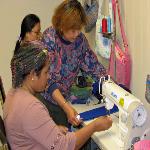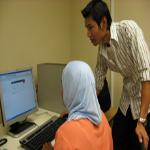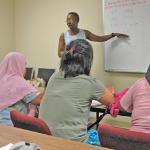22 July 2010

Photo: Erika Celeste
Phyu Phyu Aye teaches sewing and helps her students adapt to a new culture at the Refugee Resource Center.
Fort Wayne, Indiana, deals with cultural obstacles every day.
The Midwestern city of 250,000 is not only home to the largest Burmese community in America, the U.S. State Department also uses it extensively as a resettlement site for refugees from around the world.
It's home to Bosians, Darfurians, and Hispanics, among other groups.
Melting pot
Minn Myint Nan Tin, with the Burmese Advocacy Center, or BAC, says keeping this melting pot from boiling over is a delicate balancing act.

Erika Celeste
Nyein Kyaoo helps his students learn computer skills as well as the differences between Burmese and US society."Sometimes people need to take time to adjust to a new place, a new culture, a new system," she says, but adds, "you can't excuse [inappropriate behavior] either. It doesn't matter if you're American or Burmese or Latin or African."
Nearly all refugees in the Fort Wayne area visit the Refugee Resource Center. BAC and 10 other organizations offer services and classes there, in everything from how to clean a home, to proper indoor plumbing etiquette, to employable skills. These are new concepts for people who may have lived in rural areas or refugee camps all their lives.
Job and people skills
Phyu Phyu Aye, a Burmese refugee who's lived in the United States for a decade, teaches sewing at the Center, but also advises her students on many cultural issues.
For example, she explains that it is important to look Americans in the eyes when speaking, as opposed to the Asian custom of looking at the ground.
In the adjoining room, students in a computer class overhear the cultural discussion and join in. Instructor Nyein Kyaoo says he also speaks about American culture in his class.

Erika Celeste
Immigrants attend an English language class at the Refugee Resource Center in Fort Wayne, Indiana.The different cultural norms were highlighted this past spring, when a public laundry facility in Fort Wayne posted a sign stating that Burmese customers were not welcome. The sign was prompted by an incident in which a few Burmese refugees doing their laundry there were chewing betel nuts, and repeatedly spat the blood red juice on the laundromat floor.
Connecting with first responders
Across town, the Multi-Cultural Council is taking another approach to reducing cultural misunderstandings.
MCC Director Irene Paxia grew up in Italy, and knows first-hand how language barriers can waste precious time in emergencies.
She recalls her immediate response after a recent car accident when she automatically dialed Italy's 118 distress code instead of America's 911. "Right away, I was brought back to reality, how things can be difficult for me as well."
To help reduce these barriers, MCC is working with Fort Wayne's police, fire, and ambulance services, who are first on the scene in emergencies. Council members go door-to-door, distributing special magnetic emergency cards to refugee and immigrant homes. In a crisis, first responders know to look for the card on the refrigerator, to learn the victim's language and other important information.
A large part of the council's job is also spending personal time in refugee neighborhoods. Because many immigrants are from countries where government authorities repress and persecute their own citizens, they're often afraid to report crimes in the U.S. Sometimes they're reluctant to take part in important training such as fire safety classes and child identification programs, which guard against abduction.
During their meetings, MCC staff members and volunteers discuss ways of cutting through those fears with police officers and firefighters.

Erika Celeste
A Fort Wayne laundromat reworded its sign to prohibit the action, rather than the people.Cultural understanding
MCC members are slowly making inroads.
In 2007, after a fire destroyed an apartment complex housing dozens of immigrant families, only one family accepted help from MCC. But in a similar incident this year, most of the families used its services.
And the laundromat incident was resolved through some of these programs, too. The company offered a public apology, donated funds for diversity training, and changed its sign to prohibit the action 'betel nut spitting,' instead of the people.